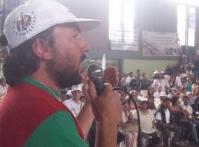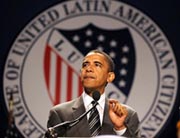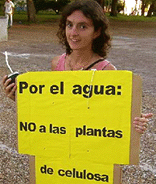
Argentina: To Live with Dignity is to Build a New World
“My papa settled here in 1944,” Pablo Sarmiento says in a serene voice and gentle manner, as he looks at the ruins of his home that was torn down by a multinational’s bulldozers.

“My papa settled here in 1944,” Pablo Sarmiento says in a serene voice and gentle manner, as he looks at the ruins of his home that was torn down by a multinational’s bulldozers.

Source: Americas Program
At the end of December, the first popular uprising in the region against a government of the left took place in Bolivia. It was caused by an excessive increase in the price of fuels. The event demonstrates the difficulties of entering into a truly alternative mode of development, but it also reveals the limits of the Bolivian government’s stated effort to re-establish and decolonize the state.
The Ipsos Institute released a survey showing that the popularity of President Evo Morales fell from 84% in 2007 to 36% in January of 2011. The results are worse for Vice President Alvaro García Linera whose level of approval fell from 46% in November of 2010 to 29%.

Source: Americas Program
In many ways, the first decade of the 21st Century was the flip side of the last decade of the twentieth century in South America. There have been numerous and significant changes. We still don’t know if it’s a glitch in time or a new beginning. In any case, the region will never be the same.
Carlos Menem, Alberto Fujimori, Carlos Andrés Pérez, Fernando Henrique Cardoso, Julio María Sanguinetti, Gonzalo Sánchez de Losada, Hugo Bánzer… The names of the figures who dominated the 90s say it all: it was an era of privatization and deregulation, of the unprecedented shrinking of the state, an intense concentration of wealth and a dramatic increase in the presence of transnational corporations. Calculations made by Brazil, where whole sectors of the economy were privatized, estimate that 30% of the Gross National Product changed hands in these years. “A veritable earthquake,” writes the Brazilian sociologist Francisco de Oliveira[1].

Source: Americas Program
A new indigenous uprising began in defense of water sources threatened by open air mining in Ecuador in late September. This time indigenous organizations find themselves up against a government that claims to be anti-neoliberal, a player in the "socialism of the 21st century," and one that has begun a "citizen’s revolution."
"What happened in Cochabamba in the fight for water will be dwarfed by what is about to happen in Ecuador. An uprising is coming because it is coming," affirms a convinced Carlos Pérez Guartambel, president of the Azuay Union of Community Water Systems (Unión de Sistemas Comunitarios de Agua del Azuay).1 Pérez is referring to the Water War of Cochabamba, Bolivia, a vast social insurrection that put a stop to the privatization of water and, in April 2000, began a succession of protests that brought Evo Morales to the presidency.

Six months have passed since Barack Obama was installed in the White House. Not much time, but enough to observe changes and continuities in the United States relationship with Latin America. Prominent analysts have emphasized the changes. In his Le Monde Diplomatique column entitled "Positive Balance", Ignacio Ramonet argues that Obama has not made serious mistakes, maintains a high level of popularity and has fulfilled his main promises, including beginning a new era in relations with Latin America.

The construction of two huge cellulose factories on the Uruguay River that threaten to pollute the binational stream illustrates how a model of forestry imposed by neoliberalism in the 1990s is gaining ground in the Southern Cone. Standing on a makeshift stage in the center of Montevideo, writer Eduardo Galeano addressed the crowd in a calm tone: "There are decisions that are made in 15 minutes but have consequences for centuries." It was May 27, 2005 during a demonstration against the construction of two huge cellulose factories on the shores of the Uruguay River. It was not the first time that environmental and social organizations had taken to the streets to protest the two megaprojects, which threaten to pollute the country's main river, shared with Argentina. But it was the first time that it was done under a progressive or leftist government.
Copyright Toward Freedom 2019